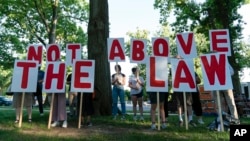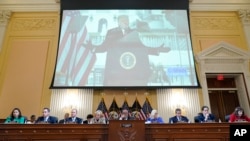In the first of a series of public hearings held by the congressional committee investigating the attack on the U.S. Capitol on January 6, 2021, Wyoming Representative Liz Cheney, one of two Republicans on the nine-member panel, laid out what its members intend to demonstrate over six additional hearings this month.
Cheney’s message was blunt. The committee, she said, will seek to demonstrate that former President Donald Trump “oversaw and coordinated a sophisticated seven-part plan to overturn the presidential election and prevent the transfer of presidential power.”
She then outlined the topics of six pending hearings that, she said, would establish that Trump knew he had lost the election but mounted a massive disinformation campaign claiming the election had been stolen; that he attempted to force the Department of Justice to participate in his plan; that he and his associates acted in concert to overturn the result, including by “corruptly” pressuring other public officials; and finally, that he “summoned a violent mob and directed them, illegally, to march on the U.S. Capitol” and refused to take action to stop the assault.
Former prosecutors see road map
Multiple former federal prosecutors told VOA that they felt Cheney and the members of the committee, which is chaired by Mississippi Democrat Bennie Thompson, are trying to lay out a blueprint for a criminal prosecution of the former president and, perhaps, some of his associates.
“Cheney’s remarks actually read very much like a prosecutorial opening argument,” former federal prosecutor Danya Perry told VOA. “It was very methodical, it was very to the point, it was very direct. And it really did lay out a road map.”
Perry, a founding partner of the Perry Guha law firm, said that there appeared to be two audiences for the presentation: U.S. Attorney General Merrick Garland and the American people.
She said that success in reaching both audiences would be critical to any federal criminal prosecution, because Garland is widely seen as resistant to anything that might be characterized as a political prosecution.
“Unless there’s a groundswell in the American electorate, he may be disinclined to pursue criminal charges,” Perry said.
‘Powerful case to indict’
Donald B. Ayer, a former U.S. attorney during the Reagan administration and deputy attorney general during the George H. W. Bush administration, told VOA that the committee’s presentation Thursday night was well-conceived and effective.
“If you assume that the evidence is what they say it is, and they can show all these things, then what’s there is an extremely powerful case to indict Donald Trump and a bunch of other people,” he said.
“Now, the members of the committee are not the ones to decide that, and they’re not doing this primarily for that purpose,” Ayer added. “They’re doing it to address the systemic problem that this reveals, and then figure out what legislatively ought to be done to deal with it.”
Establishing knowledge
At the next hearing, to take place Monday morning, Cheney said, the committee will present evidence that “Donald Trump and his advisers knew that he had, in fact, lost the election” but that he still “engaged in a massive effort to spread false and fraudulent information – to convince huge portions of the U.S. population that fraud had stolen the election from him.”
Establishing Trump’s knowledge of his loss, experts said, would be vital to any prosecution.
“If there were to be a criminal prosecution,” Ayer said, “it would be critically important to demonstrate that Trump understood that he had lost the election, but proceeded with his plans anyway. The statutes may well not require that, but absent evidence that Trump knew he had lost, the moral authority of the prosecution would collide with the public’s sense of equity and propriety.”
For his part, the former president appeared ready to contest any claim that he “knew” that he had lost the election.
On Truth Social, a social media platform owned by his company, he wrote Friday, “Many people spoke to me about the Election results, both pro and con, but I never wavered one bit – follow the facts and proof. The 2020 Presidential Election was Rigged and Stolen.”
Acted ‘corruptly’
In future hearings, Cheney said, the committee will demonstrate that Trump was acting corruptly both when he tried to install a new attorney general who would support his claims about the elections and when he pressed state elections officials and others to change the election results.
The use of the word “corruptly” is no accident, said Noah Bookbinder, president and CEO of Citizens for Responsibility and Ethics in Washington.
Bookbinder, a former chief counsel for criminal justice for the Senate Judiciary Committee and a former trial attorney for the Department of Justice’s Public Integrity Section, told VOA that the word is taken directly from some of the statutes under which Trump might be charged.
“A number of the federal laws that any prosecution would likely focus on with Donald Trump specifically use the word ‘corruptly’ as the level of intent that prosecutors need to prove,” he said.
For example, it is not inherently wrong for a president to replace a sitting attorney general.
“But if that is done as part of a scheme to misuse the Justice Department to attack an election by pushing unsubstantiated charges of fraud, something that is otherwise a kind of an innocuous act can become part of a criminal conspiracy,” Bookbinder said.
By alleging that Trump acted corruptly, he said, the committee “is both showing that these acts that could otherwise be lawful, were not in this context, and also signaling that they believe they have the goods to meet the requirements of these criminal laws, where this question of intent is going to be a lot of the ballgame.”
Trump reacts
Trump was aggressively critical of the committee hearing, and at one point seemed to praise those who assaulted the Capitol on January 6.
Fifteen minutes before the hearing was to start Thursday, he used his Truth Social account to post this message:
“The Unselect Committee didn’t spend one minute studying the reason that people went to Washington, D.C., in massive numbers, far greater than the Fake News Media is willing to report, or that the Unselects are willing to even mention, because January 6th was not simply a protest, it represented the greatest movement in the history of our Country to Make America Great Again. It was about an Election that was Rigged and Stolen, and a Country that was about to go to HELL..& look at our Country now!”


